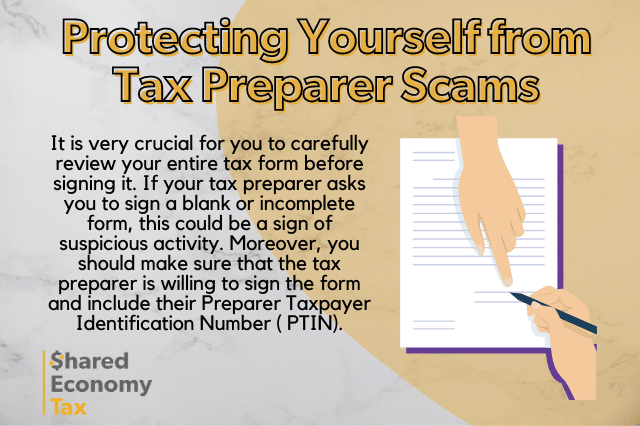
As we head into the 2026 tax season, it’s more important than ever to be vigilant when choosing someone to help you file your taxes. The IRS continues to crack down on tax fraud, but that hasn’t stopped scammers from evolving. New tax preparer scams are targeting everyone from gig workers and independent contractors to real estate investors and Airbnb hosts.
In this post, we’ll walk you through the most common tax preparer scams to watch for in 2026, highlight emerging red flags, and explain what to do if you suspect you’ve been targeted. Whether you’re filing for the first time or have been in business for years, staying informed is your best defense.
Tax Preparer Scams in 2026
Working with a fraudulent tax preparer can expose you to more than just unnecessary fees or headaches—it can result in identity theft, lost refunds, and IRS audits that take months to resolve. Many of these scams begin with a simple promise: “We’ll get you the biggest refund possible.”
In reality, these promises can lead to inflated deductions, falsified income, or misused credits, all of which leave you legally responsible. That’s why choosing a tax preparer should never be based solely on price or speed.
Scammers know people are under pressure to file early and fast. They exploit that urgency with too-good-to-be-true promises, aggressive advertising, or referral schemes designed to build trust quickly. Knowing how to recognize those patterns can help you steer clear.
Why Tax Preparer Scams Are Getting Harder to Spot
One of the biggest shifts we’re seeing heading into 2026 is that scams no longer look like scams.
In the past, fraud often came from obvious bad actors — pop-up storefronts, cash-only operators, or people promising outrageous refunds with zero paperwork.
Today, many questionable preparers operate under polished branding, professional-looking websites, and even strong online reviews. Some are heavily marketed through influencer partnerships or referral networks, which creates a false sense of legitimacy.
In other words, the danger isn’t always the shady operator on the corner — it can be the well-packaged service that looks credible on the surface but cuts corners behind the scenes.
A Changing Risk Environment for Independent Earners
As more people earn income through platforms, short-term rentals, and contract work, tax filings are becoming more complex.
This complexity creates opportunity — not just for legitimate advisors, but for bad actors who claim to specialize in these areas.
Some preparers lean heavily on the complexity of these income streams to justify aggressive positions that may not hold up under scrutiny. Because independent earners often deal with multiple income sources and unfamiliar reporting rules, it can be difficult to tell the difference between legitimate planning and risky interpretation.
The more complex your income becomes, the more important it is to work with someone who prioritizes accuracy over optimization. A qualified advisor should be able to explain the reasoning behind your return in plain terms.
If a tax advisor promises better results without being able to provide a clear explanation of how they will produce them, that is a serious warning sign. Don’t let an unsubstantiated promise of tax savings drag you into a bad situation with an untrustworthy firm.
Common Red Flags to Watch Out For
Some signs are classic and haven’t changed for years. Others are newer for 2026, reflecting current tax scams spreading through social media and AI-driven fraud schemes.
Watch out if a tax preparer:
- Promises unusually large refunds without reviewing your documentation.
- Bases their fee on a percentage of your refund.
- Refuses to sign your return or enters their name as “self-prepared.”
- Asks you to sign a blank return or doesn’t give you a copy.
- Requests refund deposits to an unfamiliar or shared bank account.
- Offers to file ERC claims or “secret” credits without verifying eligibility.
In 2026, watch for scammers claiming they can help you “opt out” of IRS systems, submit returns with AI-generated write-offs, or file “sovereign citizen tax exemption forms.” These are red flags—not legitimate tax strategies.
The Most Common Tax Preparer Scams in 2026
These are the most common tax prep scams currently going around at the time of writing.
Phantom Tax Preparers
One of the more frustrating scams involves preparers who seem legitimate at first — until they suddenly aren’t.
Phantom tax preparers often present themselves as experienced professionals during the busiest weeks of filing season. They may operate out of temporary offices, advertise aggressively online, or rely on word-of-mouth referrals to build quick trust.
On the surface, everything appears normal. Documents are collected, a return is prepared, and the client is told the filing has been completed.
The problem is that, in some cases, the return was never filed at all.
By the time the taxpayer realizes something is wrong — perhaps because a refund hasn’t arrived or an IRS notice shows up — the preparer is no longer reachable. The office may be closed, phone numbers disconnected, and online profiles removed.
Because the IRS ultimately holds the taxpayer responsible for the accuracy and submission of their return, the consequences don’t disappear along with the preparer. If a return wasn’t properly filed or contained errors, the taxpayer may still face penalties, interest, or delays.
Inflated Refund Claims
Another common issue arises when preparers focus more on producing an impressive refund than on filing an accurate return.
In these situations, the preparer may adjust figures, claim unsupported deductions, or include credits the taxpayer may not actually qualify for. To the client, the result can seem like a win — a larger refund than expected.
But that outcome often comes at a cost.
The preparer may collect a fee tied to the size of the refund, then move on once the return is submitted. Months later, when the IRS reviews the filing, discrepancies may surface.
At that point, the responsibility shifts back to the taxpayer. If income was misreported or deductions were overstated, the IRS may request repayment of the excess refund along with applicable penalties and interest.
Identity Theft and Fraudulent Filing
This scam has surged lately due to AI-powered phishing and data scraping tools. Fraudulent preparers may collect your Social Security number, driver’s license, address, and banking details under the pretense of filing your return. Then, they file a return in your name without your knowledge and redirect the refund to themselves.
Watch out for any preparer who insists on creating your IRS online account on your behalf or who asks for credentials to log in “just to verify your info.”
If a fraudulent return is filed using your identity, the impact may not be immediate — but it can quickly become disruptive.
You may first notice something is wrong when your expected refund doesn’t arrive, or when the IRS flags your account for review. In some cases, your refund may be delayed while your identity is verified, or you may receive correspondence asking you to confirm information you didn’t provide.
Resolving the issue often involves proving that the return was filed without your authorization. This process can take time, especially if funds were already disbursed or additional verification steps are required.
Acting quickly can make a meaningful difference. Reporting preparer misconduct using IRS Form 14157 and submitting Form 14039 to flag potential identity theft can help begin the resolution process and protect your account from further misuse.
While the process can feel overwhelming, early action improves the likelihood of a smoother outcome.
ERC, AI, and Credit Scheme Abuse
Some tax prep companies are advertising “AI-optimized tax savings” that don’t comply with IRS regulations. Others are pushing amended returns for ERC credits that the business is not eligible for.
These services often come with steep upfront fees or contingency-based pricing and can trigger major audits.
Unauthorized Refund Diversions
Refund diversion scams continue to grow because they’re relatively simple to execute and can be difficult to detect until it’s too late.
In these situations, the preparer files a return correctly — but alters the refund destination so the money is routed somewhere other than your personal account. Sometimes this happens under the guise of convenience, with the preparer offering to “handle” the refund process or suggesting that routing funds through their system will speed things up.
The safest approach is to make sure your refund is always deposited into an account that you personally control. Before signing your return, take a moment to confirm that the routing and account numbers listed for direct deposit match your own banking information.
A legitimate tax preparer never needs access to your refund funds. Their role is to prepare and file your return — not to receive or manage your payment. If anyone suggests otherwise, it’s worth pausing and asking why.

Protecting Yourself from Tax Preparer Scams
The best way to avoid becoming a victim is to stay informed and proactive.
Even if you’re working with a preparer, you’re still legally responsible for your tax return. That means:
- Never sign a return you haven’t reviewed.
- Always verify your preparer’s PTIN (Preparer Tax Identification Number).
- Get a written quote or fee agreement before filing begins.
- Ask questions—good preparers welcome them.
- Make sure the refund is deposited into your own bank account.
- Save a full copy of your return and supporting documentation.
These precautions won’t just protect your refund—they’ll help you catch errors that could lead to bigger problems later. Keep a vigilant eye out for red flags so you don’t expose personal information, and don’t hesitate to contact the authorities if you believe a crime has been committed.
What to Do If You Suspect You’ve Been Scammed
If you think your tax preparer has acted fraudulently, start by contacting the IRS immediately. The IRS has a dedicated form—Form 14157—to report tax preparer misconduct. You may also need to submit Form 14039 if you believe your identity has been stolen.
Next, alert your bank, monitor your credit reports, and consider placing a fraud alert or credit freeze. You should also notify local law enforcement and the Federal Trade Commission (FTC), especially if you suspect stolen funds or identity theft.
Keep copies of all correspondence and file everything as quickly as possible to demonstrate that you acted in good faith.
How to Find a Qualified Tax Preparer
A good tax preparer should:
- Have a valid PTIN and verifiable experience.
- Use secure methods to collect, store, and transmit your documents.
- Charge a transparent, flat fee—not a percentage of your refund.
- Sign the return and provide you with a copy.
- Be willing to answer your questions and walk you through the process.
CPAs, Enrolled Agents (EAs), and tax attorneys have the highest credentials. But many qualified preparers without those titles still do excellent work. When in doubt, check the IRS Directory of Federal Tax Return Preparers and lean on your network for referrals.
Closing Thoughts on Tax Preparer Scams
Most tax professionals are honest, hard-working people trying to help clients stay compliant and save money. But like every industry, tax prep has its share of bad actors.
The best defense is knowledge. If someone is promising something that sounds too good to be true—it probably is. Vet your tax preparer thoroughly, and never forget that you are ultimately responsible for your return.
At Shared Economy Tax, we specialize in helping independent contractors, Airbnb hosts, and real estate investors navigate their taxes with confidence and clarity. Our firm-level expertise ensures you get the deductions you deserve—without putting your future at risk. Get started now by booking a 1-on-1 strategy session and see how much you can save.